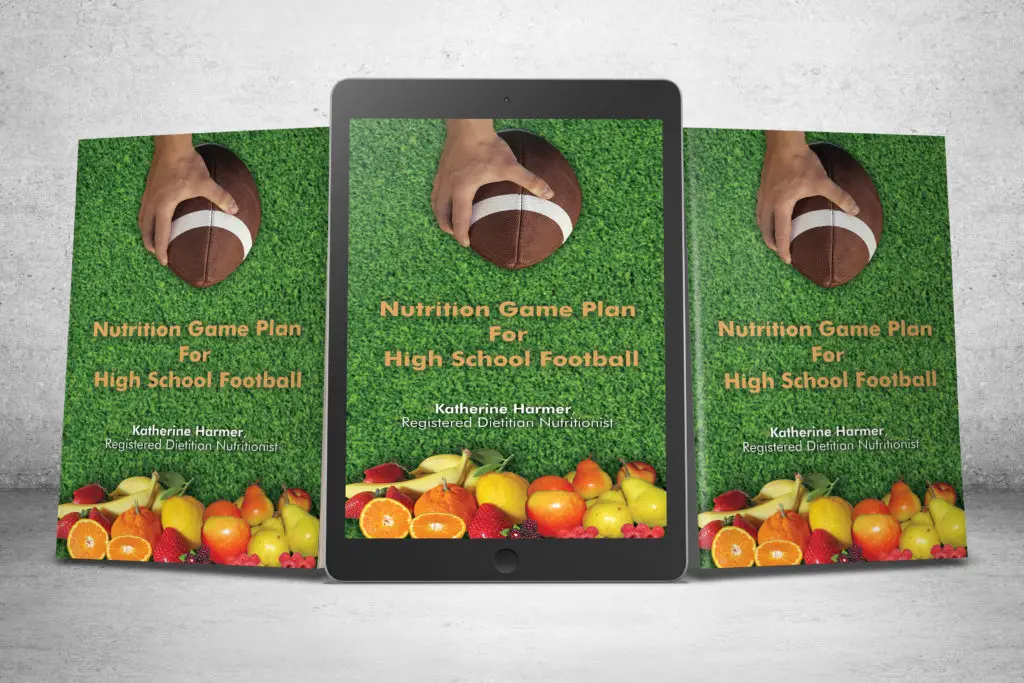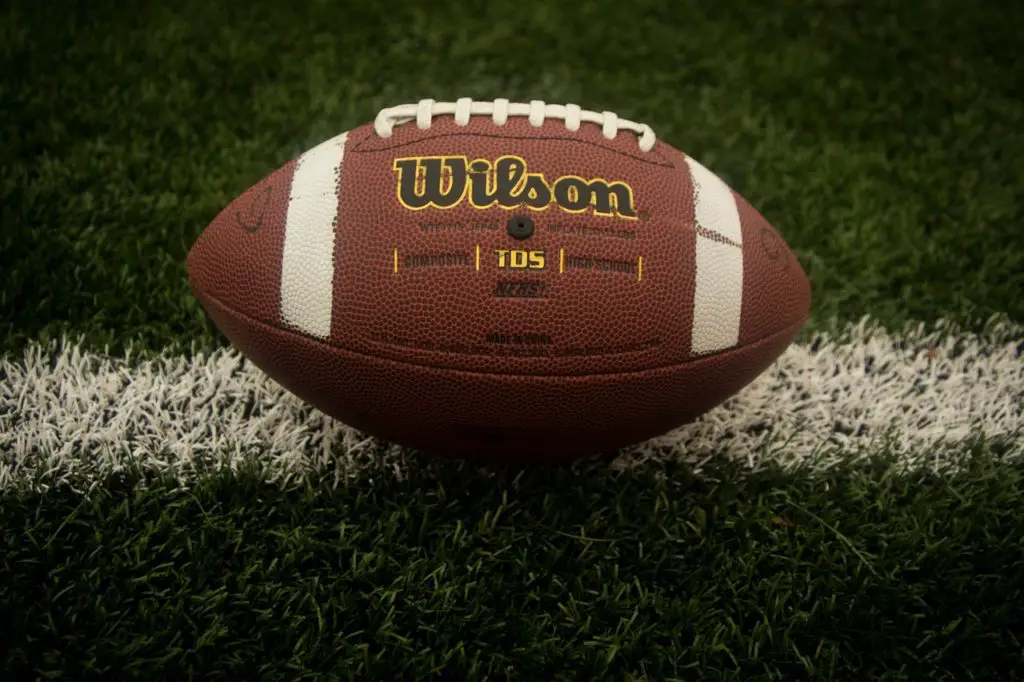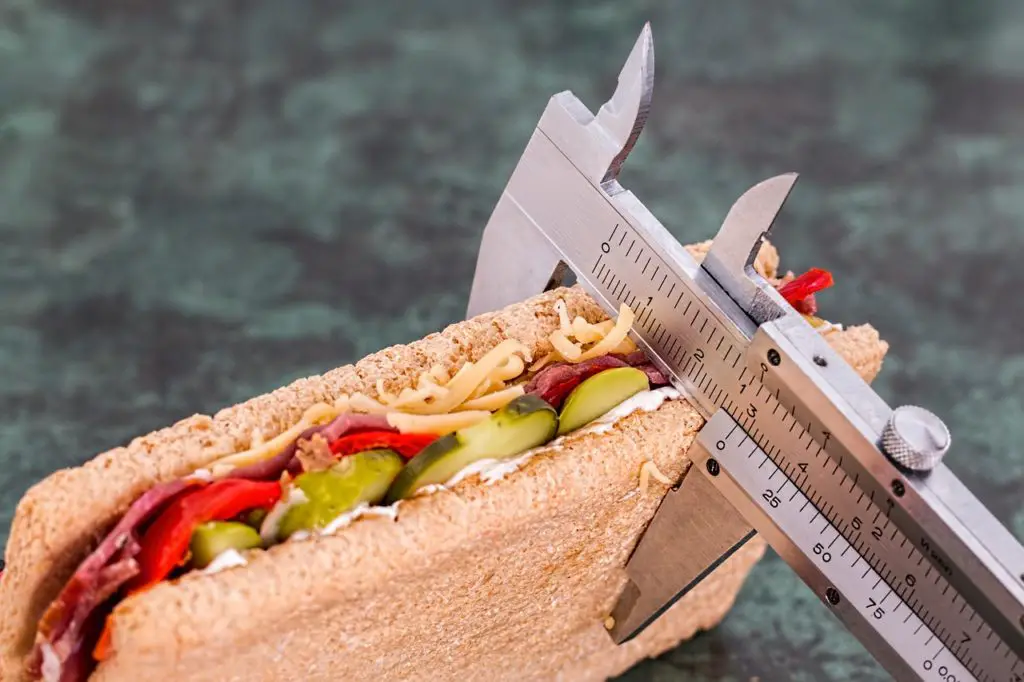Making sure your high school student athlete is eating the appropriate amount of calories and nutrients each day is a big job. I want to give you some tips so you can make sure they are eating right to fuel their play.
Typically, high school football players need around 3,000 and up to 4,000 calories per day, depending on several factors like gender, height, weight, and activity level.
Help your teenage football player perform at the best of their ability and remain healthy. Get calorie recommendations, food group amounts, healthy tips, and more below.
Looking for a little more help and guidance this season? I’ve got you covered:
Nutrition Game Plan for High School Football Ebook

All you need to know for a healthy football season! Including a 28-day meal plan, snack idea list, tips for what, when, and how much to eat for football, plus more. Fuel up for your best football season yet and rise above the competition!
Click here for more information.
How Many Calories Should a Teenage Football Player Eat?
Have you observed how much a high school athlete can eat? Can you keep your teenage football player fed and nourished adequately? Teenage football athletes need 3000 – 4000 calories per day.
High school football players are going through a big stage of growth, plus they are exercising many hours per week. That means they need a lot of energy and nutrients! Make sure they are eating the right stuff to fuel their body for top athletic performance and growth benefits for success.
When it comes to eating, diet and exercise go hand in hand in order to have top health and performance of high school athletes. To help you have an idea for how much food a teenage football athlete should be eating, this post discusses calorie recommendations and nutrient requirements.
What Factors Increase Calorie Recommendations for Teenage Football Players:
Growing teenagers going through puberty need extra calories and have additional nutritional needs.
Athletes need extra calories and have additional nutritional needs.
So teenage athletes are like the double bonus- they have major additional nutritional needs.
Your body requires more calories during the teenage years than at any other time in life. High school football players are expending more energy plus they are growing and developing into adults.
They need the appropriate calories to fuel their bodies for football and growth. The extra calories are needed to help them grow taller and bigger and develop more muscle mass.
Caloric and nutrient needs increase with height, weight, BMI, more exercise, and other factors. Football players also may have more muscle mass than typical teenage boys, meaning they burn more calories at rest and require more calories to maintain muscle mass.
The amount of food and calories teenage football players can eat also depends on age, gender, and skill level of the football player (position played and intensity of exercise). Because football is an intense sport, high school football players need more calories and nutrients than the average teenager during football season.

How Many Calories Should A High School Football Player Eat?
The average high school male requires around 2,800 calories per day*. With participation in higher intensity sports, such as football, athletes need more nutrients than the average high school male. The daily calorie recommendation for high school football players is anywhere from 3000-4000 calories per day.
High school football players typically range from ages 14-18, and at this stage of teenage puberty years they have higher nutrient needs to support growth and development and hormone changes. A teenage football athlete needs an increase in calories to fuel growth and physical activity appropriately.
In general, I would recommend starting with at least 3000 calories per day for a teenage high school football athlete. My meal plans are written for 3000 calories per day, but amounts can easily be adjusted based on needs.
3000 calories is just an estimate. This is based on the age, average size, and amount of exercise per day for a football athlete (about 2-3 hours of football practice). Individual requirements can be calculated and are based on height, weight, body composition, activity level, and more.
You can calculate your own recommended calorie range fairly accurately with a calorie calculator right here. (This uses the Mifflin-St Jeor equation to calculate BMR, the most accurate method, but is typically used for adults.)
Calorie equations are just an estimate because each person is different. While these recommendations are not personalized for each individual type of athlete, they can be a handy guide to get you started.
Learn how to eat by listening to your hunger cues and keeping in mind recommendations to fuel workouts. If your goal is to gain weight, eat a little bit more than normal, and if your goal is to lose weight, eat a little bit less. I’ll share more specific tips to get you started.

Tips For Gaining Weight For High School Football Players:
Talk with your coach, your parents, and your doctor before deciding you need to bulk up for football. Make sure your goals are appropriate, healthy, and reasonable for your age. If you still want to be bigger for football, choose to gain muscle and not excess body fat.
To eat to gain weight, follow these tips to get enough calories:
- Choose nutrient-dense foods.
- Plan for 300-500 extra calories per day (that is 1-2 extra snacks).
- Eat at least 5 times per day- Eat 3 good sized meals with 2 snacks. If you have a smaller appetite, eat more often during the day.
- Drink your calories- but not with soda. Choose milk, fruit smoothies, juice, protein shakes, or sports drinks.
- Drink fluids between meals (not with meals) to leave more room for food.
- Add higher-calorie foods to your meals, such as cheese, peanut butter, sour cream, salad dressings, or butter.
- Choose full-fat versions of foods and not “lite” or “low-fat” or “low-calorie”.
- Increase your intake of healthy fats such as olive oil, nuts, seeds, and avocados.
- Keep a supply of healthy snacks with you at all times (trail mix, granola bars, crackers, dried fruit).
If your goal is to build muscle, remember that eating more protein doesn’t equal bigger muscles. You need to be smart in how you plan to gain muscle for football. Muscle growth is a complex concept that requires more than just exercise or protein supplements.
To successfully build muscle you need to make sure you are eating enough calories and protein, and including strength training. Adding extra protein to your diet will not help you build muscle. Most teens get plenty of protein, so the timing of the protein you eat is essential.
Within 1-2 hours after exercise you should include some type of protein food or snack. Eat a balanced meal that or include a snack with eggs, greek yogurt, milk, meat, nuts, beans, cheese, or even a protein bar.
Every 3-4 hours throughout the day be sure to include a protein food with your meal or snack. For additional ideas check out my post What Should Football Players Eat After a Game? and The BEST Pre-Workout Meals and Snacks for a Teenage Athlete.
What Should A Football Player Eat?
Now that you have an idea of how many calories you need per day as a teenage football athlete, what do you actually need to eat each day?
I don’t necessarily recommend to count calories daily (unless you have specific goals), but to instead learn to eat an appropriate amount of food and nutrients at appropriate times throughout the day.
It might be helpful once or twice a month to keep a food log and total calories and nutrients at the end of the day to get an idea, but it’s best to learn how to eat with a good balance that will supply you with the nutrients you need.
A high school football player should have a balanced diet of each of the food groups in order to get the nutrients they need to fuel their growing bodies.
(I also have a FREE football meal plan if you’re interested or a 28-day meal plan ebook!)
Here’s a quick example of foods from each of the food groups:
- Dairy: Milk, yogurt, cottage cheese, cheese are great choices.
- Fruit: Eat a balance of fruit in every color. Choose from fresh, cooked, frozen, canned, dried, and juice.
- Vegetables: Choose a variety of vegetables in every color. Choose from fresh, cooked, frozen, canned, dried, and juice.
- Protein Foods: Choose animal and plant sources of protein such as meat, poultry, fish, eggs, dairy, beans, legumes, nuts, and seeds.
- Grains: Choose healthy options such as oatmeal, brown rice, whole wheat bread, whole wheat pasta, whole wheat tortillas, whole wheat crackers, etc.
It is easier to focus on the correct amount of food from each food group than to count calories. The average teenage male needs about 3 servings of dairy per day, 2 cups of fruit, 3 cups of vegetables, 6 1/2 ounces of protein (see protein equivalents), and 4 ounces of grain equivalents in order to meet nutritional needs and hit their calorie recommendations, about 2800 calories per day.
This is a good starting point for athletes as well. In order for high school football players to reach their calorie goal (between 3000-4000 calories), they should start focus on getting a balance from each food group and slowly increasing their intake to hit the recommendations.
Food Group Recommendations for a High School Football Player (starting at 3000 calories):
- Dairy: 3 cups per day
- Fruit: 2 1/2 cups per day
- Vegetables: 4 cups per day
- Protein Foods: 7 ounces per day
- Grains: 10 ounces per day
Do your best to follow a healthy eating plan and you will notice tremendous performance benefits on the football field.
Need some more help with eating? Be sure to check out my FREE Meal Plan for High School Football Athletes.
A Plea to Parents of High School Football Players:
The teenage years are crucial for developing healthy eating habits and food preparation skills. High schoolers have a busy schedule and often lack the ability and skills to prepare their own meals, plus they typically don’t help with grocery shopping or food preparation at home.
Along with school, homework, enough sleep, and other extra curricular activities and responsibilities, hectic schedules may make it difficult for football players to plan ahead well enough for meals to get the appropriate nutrition they need. Trying to get a proper diet is difficult enough as a teen, but add a football schedule of 1-2 games per week plus 2-3 hour practices per day, it can be stressful.
Please help your teen eat right! It doesn’t need to be overly-complicated, but please help your teen. Teach them some healthy eating habits plus food-prep skills for success.
Teens need some help planning meals from home. Do your best, something is better than nothing.
Tips for parents to help your teen eat a healthy diet:
Let your child prepare simple meals- Teach teens to prepare a healthy breakfast by themselves, or help when they are in a rush.
Plan ahead for lunch- Pack lunches and snacks the night before. Teach your teen how to pack an appropriate lunch. Encourage your high schooler to pack their lunch for school. USDA school lunches often don’t meet the nutrient requirements to fuel a teenage football player.
Have dinner at home- Do your best to have a home-cooked meal as a family each night. Prepare a balanced meal that will fuel your teenage football player and your family. Have your teen help in the kitchen when possible. If you are busy during the week, meal plan on weekends or try a meal delivery service to make things easier.
Keep healthy snacks on hand- Have some healthier grab-and-go foods so your teen never skips a meal, including breakfast. Examples: fruit, hummus and crackers, string cheese, dried fruit, trail mix, low-sugar granola or energy bars, hard-boiled eggs, packaged yogurt and granola, overnight oats, etc.
Boost nutrients- If your teen is going to eat school lunch every day, send some additional snacks/fruit/veggies for added calories, protein, and overall nutrition.
Be in control what foods are in the house- Buy healthy foods and leave the junk food out of your grocery cart and out of your house. You are the “gate-keeper”. If it is not there, it won’t be a temptation, and they won’t eat it.
Make healthy eating a family affair- encourage the whole family to make healthier choices by including more fruits and vegetables, lean proteins, whole grains, low-fat dairy, and limiting junk foods, packaged foods, soda, desserts, and eating out.
Always make a plan for the week- this will help you when grocery shopping and preparing foods. Start with one week at a time of planned and packed meals.
Choose one tip to work on at a time. It takes practice and training, but stay committed just like your teen is doing everyday for football. It’s worth it, your teen will learn awesome habits and skills from home that will provide success long term.
Summary
- High school football athletes need a tremendous amount of calories because they are growing and developing into adults and they are engaging in regular vigorous physical activity.
- High school football players typically need 3000-4000 calories per day. Individual requirements can be calculated and are based on height, weight, body composition, activity level, and more.
- To gain weight and reach calorie recommendations, a teenage football athlete should eat more often during the day and focus on high-nutrient dense foods.
- To gain muscle, a teen football player doesn’t need to eat more protein. They should focus on having a balanced diet with a slight increase in calories; with appropriate timing of protein intake throughout the day, plus extra time in the gym.
- A high school football player should aim for 3 cups of dairy, 2 1/2 cups of fruit, 4 cups of vegetables, 7 ounces of protein foods, and 10 ounces of grains per day for a healthy and balanced diet that will help them reach nutrient and calorie recommendations.
- Most high schoolers do not prepare their own meals, they need assistance and help in proper planning from parents and family for success.
- If you found this helpful, but you’re looking for more help- check out my Nutrition Game Plan for High School Football ebook. All you need to know for football nutrition in one place!
Check out some of my other popular football posts:
- FREE Meal Plan for High School Football Players
- Is Whey Protein Safe for Teenage Athletes?
- What Should Football Players Eat After a Football Game?
- The Worst Foods to Eat Before Football
- What is the Perfect Size for a Football Player?
Go. Eat. Win!
References:
- Academy of Nutrition and Dietetics, “How Many Calories Does My Teen Need?”
- Academy of Nutrition and Dietetics, “Safe Weight Gain Tips for Underweight Kids.”
- Academy of Nutrition and Dietetics, “How Teen Athletes Can Build Muscle With Protein.”
- USDA’s ChooseMyPlate.gov
Fueling Teens is a participant in the Amazon Services LLC Associates Program, an affiliate advertising program designed to provide a means for sites to earn advertising fees by advertising and linking to Amazon.com. We also participate in other affiliate programs which compensate us for referring traffic.
